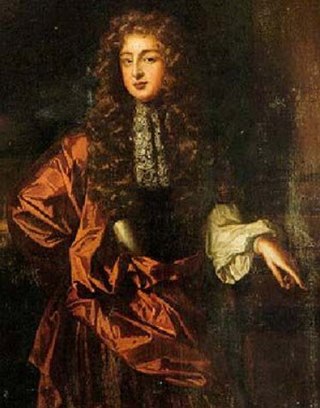Related Research Articles

The Battle of the Boyne took place in 1690 between the forces of the deposed King James II, and those of King William III who, with his wife Queen Mary II, had acceded to the Crowns of England and Scotland in 1689. The battle was fought across the River Boyne close to the town of Drogheda in the Kingdom of Ireland, modern-day Republic of Ireland, and resulted in a victory for William. This turned the tide in James's failed attempt to regain the British crown and ultimately aided in ensuring the continued Protestant ascendancy in Ireland.

The Lord Mayor of Dublin is the honorary title of the chairperson of Dublin City Council which is the local government body for the city of Dublin, the capital of Ireland. The incumbent, since June 2024, is councillor James Geoghegan. The office holder is elected annually by the members of the council.

Sir John Houblon was an English merchant and banker who served as the first governor of the Bank of England from 1694 to 1697. He also served as the Lord Mayor of London in 1695.

The Treaty of Limerick, signed on 3 October 1691, ended the 1689 to 1691 Williamite War in Ireland, a conflict related to the 1688 to 1697 Nine Years' War. It consisted of two separate agreements, one with military terms of surrender, signed by commanders of a French expeditionary force and Irish Jacobites loyal to the exiled James II. Baron de Ginkell, leader of government forces in Ireland, signed on behalf of William III and his wife Mary II. It allowed Jacobite units to be transported to France, the diaspora known as the Flight of the Wild Geese.

The siege of Derry in 1689 was the first major event in the Williamite War in Ireland. The siege was preceded by an attempt against the town by Jacobite forces on 7 December 1688 that was foiled when 13 apprentices shut the gates. This was an act of rebellion against James II.

Claud Hamilton, 4th Earl of Abercorn PC (Ire) (1659–1691) was a Scottish and Irish peer who fought for the Jacobites in the Williamite War. He went with King James to Derry in 1689 and tried to negotiate the surrender of the town with Adam Murray. He raised a regiment of horse that he led in the defeats of Newtownbutler in 1689 and Aughrim in 1691. He was killed when the ship that should have brought him to France was intercepted by a Dutch privateer.
Events from the year 1689 in England.

Henry Dillon, 8th Viscount Dillon was an Irish soldier and politician. In 1689 he sat in the Patriot Parliament. He fought for the Jacobites during the Wiiliamite War, defending Galway against Ginkel and surrendering it in 1691 after a short siege. He obtained the reversal of his father's attainder in 1696 recovering his father's lands.

Daniel O'Brien, 3rd Viscount Clare, was with King Charles II in exile during the interregnum. At the Restoration, he obtained the title of Viscount Clare for his grandfather and full restoration of the family's lands. At the Glorious Revolution he supported James II, sitting in the Patriot Parliament and fighting for him at the Battle of the Boyne. He was in consequence attainted as a Jacobite.
Sir James Fitz Edmond Cotter was a soldier, a colonial governor and the commander-in-chief of King James's forces, in the Irish Counties of Cork, Limerick, Tipperary and Kerry. He was a prominent political figure in the south of Ireland and was of Royalist and Jacobite sympathies. He was also a member of the Irish Cotter family of Norse-Gaelic origins. He was born around 1630, the second son of Edmond Fitz Garrett Cotter of Anngrove and Elizabeth Connell of Barryscourt, was knighted in 1685–1686, and died in 1705.
Sir Richard Nagle was an Irish Jacobite politician and lawyer. He held the positions of Attorney-General for Ireland, Speaker of the Irish House of Commons, Lord Justice of Ireland and Secretary of State and War for Ireland under King James II. He fled to France in 1691, joining James II at Saint-Germain-en-Laye, where he resumed his duties as nominal Secretary of State and War. He later served as Commissioner of the Household.
Sir Stephen Rice (1637–1715) was Chief Baron of the Exchequer in Ireland and a notable supporter of James II.

The siege of Carrickfergus took place in August 1689 when a force of Williamite troops under Marshal Schomberg landed and laid siege to the Jacobite garrison of Carrickfergus in Ireland. After a week the Jacobites surrendered, and were allowed to march out with the honours of war.
Sir Michael Creagh was an Irish politician and soldier.
Sir Patrick Trant, known as Sir Patrick Trant, 1st Baronet between 1686 and 1691, was an Anglo-Irish politician and Jacobite.
Sir Gregory Byrne, 1st Baronet was an Irish Jacobite soldier and politician.
Sir Thomas Hackett was an Irish Jacobite official and merchant.
Simon Luttrell was an Irish Jacobite politician and soldier.
Daniel MacCarthy Reagh, 20th Chief of the Name MacCarthy Reagh, also called Donal, was an Irish Jacobite politician and soldier. He represented Bandonbridge in the Patriot Parliament and fought and died for King James II at the Battle of Aughrim. He was succeeded in the Chiefship by his nephew, Alexander, who himself was succeeded by Daniel's father's second-cousin, Finghin of Benduff.
Sir Michael Mitchell was an Anglo-Irish politician.
References
- 1 2 3 4 5 Gibney, John (October 2009). "MacDermott, Sir Terence". Dictionary of Irish Biography. Retrieved 14 February 2023.
- ↑ O'Hart, John, The Irish Parliament of King James the Second in 1689, Irish Pedigrees: or the Origin and Stem of the Irish Nation (5th Ed., 1892), Volume 2. Retrieved 14 February 2023.
- ↑ Lord Mayors of Dublin 1665 – 2020. Dublin City Council. Retrieved 14 February 2023.